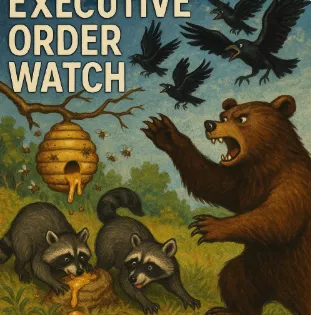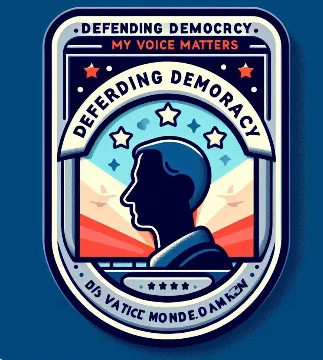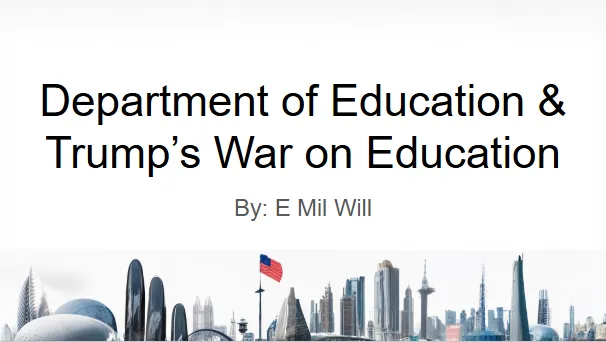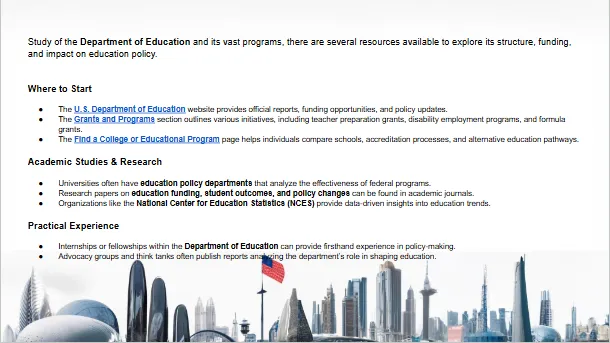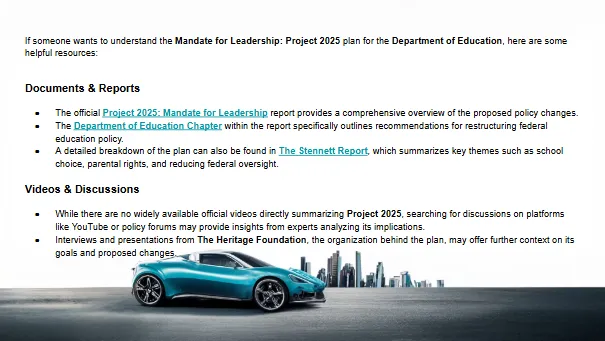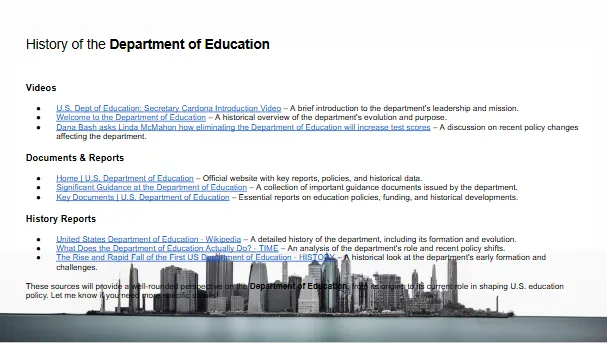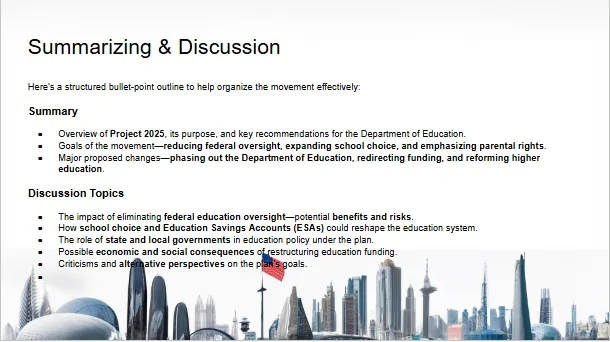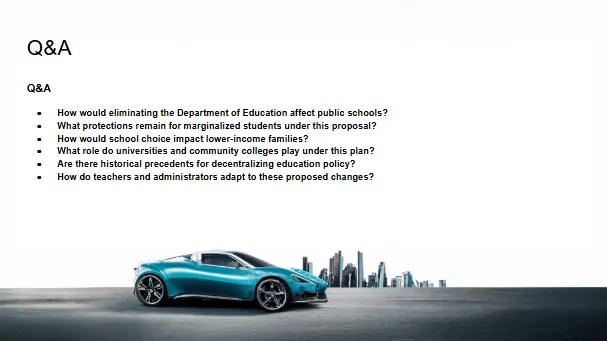UNDERSTANDING THE CONSERVATIVE PROMISE: MANDATE FOR LEADERSHIP
Project 2025 Watch
EXECUTIVE BRANCH
VS
CONSTITUTION
Chapter 18:
GENERAL WELFARE
DEPARTMENT OF LABOR
Review
Reading Mandate with Summary
Summary of the Labor Policy Section in “Mandate for Leadership: The Conservative Promise”
The document outlines a conservative overhaul of U.S. labor policy, centering on the empowerment of individual workers and traditional family values. It criticizes existing federal labor agencies like the Department of Labor (DOL) and Equal Employment Opportunity Commission (EEOC) for regulatory overreach and contends that progressive policies under the Biden administration have led to bureaucracy, ideological bias, and economic inefficiency.
Major Policy Themes & Proposals
Deregulation & Smaller Government
Roll back DEI programs, racial classifications, and disparate impact liability.
Limit EEOC authority and reduce federal enforcement in favor of compliance assistance.
Narrowing Anti-Discrimination Protections
Reframe sex discrimination to a binary definition, removing protections for LGBTQ+ individuals.
Allow religious employers exemptions from non-discrimination laws.
Oppose workplace abortion accommodations.
Workplace Flexibility & Independent Contractors
Exempt home offices from OSHA oversight.
Redefine overtime calculations.
Promote independent contractor status and reduce joint employer liability.
Religious and Traditional Family Values
Promote Sabbath work regulations and pro-life benefits.
Advocate for real-time family statistics.
Increase religious accommodations in the workplace.
Vocational Education and Workforce Development
Shift funding from higher ed to vocational training.
Support religious organizations in workforce training.
Loosen restrictions on youth employment in hazardous jobs.
Unions & Worker Representation
Increase transparency and reduce union power.
Promote alternatives like Employee Involvement Organizations.
Repeal the Davis–Bacon Act to cut prevailing wage standards.
Retirement & Investment Policy
Ban ESG investing in ERISA/TSP retirement PLANS.
Target major asset managers over ESG focus.
Increase public pension transparency.
Immigration & Labor Markets
Phase out H-2A and H-2B visa programs.
Mandate citizen-heavy federal contract hiring.
Move visa certification functions out of workforce development programs.
Chapter 18:
GENERAL WELFARE
DEPARTMENT OF LABOR
Review
PAGE 581-618
AUTHOR: Jonathan Berry
AUTHOR BACKGROUND CHECK:
Jonathan Berry is a conservative legal expert, former Trump administration official, and a key contributor to the Heritage Foundation’s Project 2025: Mandate for Leadership. He earned his undergraduate degree at Yale and his J.D. at Columbia Law School, later clerking for Justice Samuel Alito at the U.S. Supreme Court. Berry served in the Department of Justice’s Office of Legal Policy and was Principal Deputy Assistant Secretary for Policy at the Department of Labor under President Trump, where he led major regulatory initiatives. He also participated in the Trump transition team, focusing on legal and ethics matters, and is now managing partner at the law firm Boyden Gray & Associates.
For Project 2025, Berry authored the Department of Labor chapter, proposing major conservative labor reforms: scaling back federal oversight, reversing DEI initiatives, limiting union lobbying powers, and loosening restrictions on youth employment under parental consent. His vision emphasizes reducing government intervention in the labor market and promoting worker independence, aligned with broader conservative policy goals. His career and work reflect a deep commitment to reshaping labor and regulatory policy based on constitutional and free-market principles.
Department of Labor
Reforms
Slash DOL budgets, especially training programs.
Maximize political appointees and freeze career official hiring.
Narrow workplace inspections to egregious cases only.
Key Weaknesses & Critiques
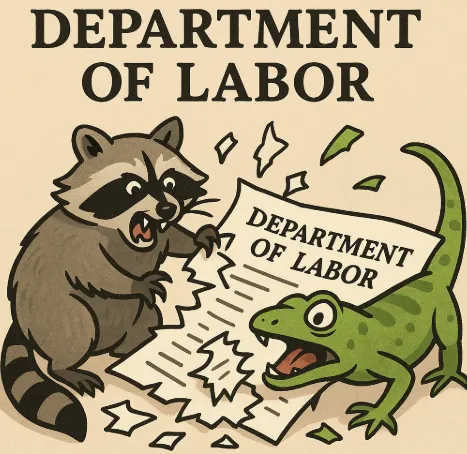
Ideological Framing:
It assumes deregulation and conservative values inherently benefit workers, without balanced evidence.
Equity Dismissal: DEI efforts are criticized without considering their role in addressing systemic inequities.
Worker Protections at Risk: Rollbacks may increase risk of discrimination, wage suppression, and exploitation.
Religious Favoritism: Emphasis on religious freedom may conflict with rights of non-religious or differently religious employees.
Economic Oversights: Many proposals lack clear implementation plans or analysis of financial and social impact—especially on small businesses and marginalized groups.
Union Hostility: Downplays the historic and ongoing role of unions in protecting worker rights.
Privatization Risks: Shifting public services to private/religious groups raises accountability and separation-of-church-and-state concerns.
Conclusion
The labor section of Mandate for Leadership proposes sweeping deregulatory changes underpinned by a conservative worldview that prioritizes individual autonomy, traditional family structures, and religious freedom. However, its policy framework risks undermining long-standing worker protections, narrowing civil rights, and destabilizing systems that promote workplace fairness and equity.
Phasing out the H-2B visa program
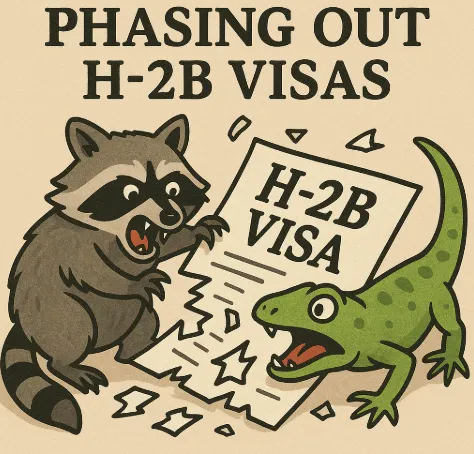
Phasing out the H-2B visa program and tightening enforcement against visa fraud would have a wide range of effects—some groups would be disproportionately impacted, both positively and negatively. Here's a breakdown of who would be hurt the most under these proposals:
📉 Most Impacted (Harmed) Groups:
1. Small and Mid-Sized Seasonal Businesses
Industries hit hard: Landscaping, hospitality, seafood processing, construction, amusement parks, and tourism.
These businesses often rely heavily on H-2B workers to meet seasonal demand when local labor is unavailable or unwilling to take these jobs.
Why it matters: Without a legal seasonal workforce, these employers may face labor shortages, reduced productivity, and rising costs.
2. H-2B Workers Themselves
Workers from countries like Mexico, Jamaica, Guatemala, and the Philippines who depend on these jobs to send remittances back home will lose income.
These jobs are often considered better-paying and safer than what’s available in their home countries.
3. Rural and Coastal Economies
Local economies in resort towns, fishing villages, and agricultural-adjacent regions depend on seasonal workers to support tourism, dining, maintenance, and hospitality sectors.
Businesses in these areas may close or reduce services if they can’t find reliable labor.
4. Consumers
If companies can't hire enough workers, you may see:
Higher prices for seasonal services (e.g., landscaping or hotel stays).
Shorter hours or lower quality in service industries. Supply chain slowdowns in seafood, meatpacking, and forestry products.
5. Law-Abiding Employers
Visa fraud enforcement will also likely lead to more audits and compliance burdens on businesses—even those acting in good faith—creating legal and administrative challenges.

⚖️ Who Might Benefit:
Domestic low-skilled workers may benefit from less competition, though economists debate whether these jobs are attractive or viable for local populations without major wage increases.
Labor unions and worker advocacy groups pushing for higher standards and wages.
Anti-immigration and protectionist factions that support reducing all forms of temporary foreign labor.
Who Does and Does Not Benefit From Phasing Out H2B Visa?
Groups That May Benefit
Domestic Low-Skilled Workers
There is debate among economists about whether eliminating the H-2B program would benefit domestic low-skilled workers, as it may reduce competition for certain jobs. However, this potential benefit may only be realized with significant wage increases.
Labor Unions and Worker Advocacy Groups
These groups may see benefits from reduced competition for jobs and the potential for increased wages and improved labor standards.
Anti-Immigration and Protectionist Groups
These groups generally support reducing all forms of temporary foreign labor and may see the elimination of the H-2B program as a positive outcome.
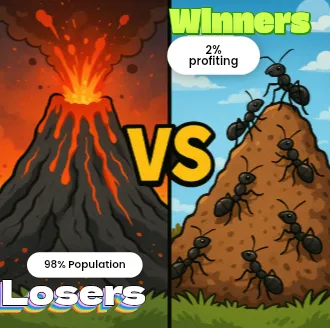
Groups Most Negatively Affected by Eliminating the H-2B Visa Program
Phasing out the H-2B visa program and increasing enforcement against visa fraud would have significant impacts on various groups. The following groups would be the most
negatively affected by these changes:
Seasonal Businesses, Especially Small and Mid-Sized
These businesses, particularly in industries like landscaping, hospitality, seafood processing, construction, amusement parks, and tourism, heavily depend on H-2B workers to fill seasonal labor shortages. Without these workers, they may experience labor shortages, decreased productivity, and increased costs.
H-2B Workers
Workers from countries like Mexico, Jamaica, Guatemala, and the Philippines rely on H-2B jobs for income that is often higher and safer than what is available in their home countries. Losing these opportunities would significantly impact their livelihoods and ability to support their families.
Rural and Coastal Economies
Local economies in resort towns, fishing villages, and agricultural areas depend on seasonal workers to support key industries like tourism, dining, maintenance, and hospitality. Without a reliable labor source, businesses in these areas may be forced to close or reduce services, harming the overall economy.
Consumers
Reduced access to H-2B workers could result in higher prices for seasonal services, reduced service quality and availability, and supply chain disruptions in industries like seafood, meatpacking, and forestry.
Law-Abiding Employers
Increased visa fraud enforcement may lead to more audits and compliance burdens for businesses, even those operating legally, creating additional legal and administrative challenges.
Proposal to Downgrade the Requirement of BA Degree Requirement for Jobs
The push to prohibit bachelor’s degree (BA) requirements in private-sector job descriptions stems from concerns about degree inflation—the increasing tendency for employers to require degrees for jobs that historically did not need them.
Reasons behind this proposal:
Expanding Job Access: Many capable workers are excluded from consideration simply because they lack a degree, even if they have the necessary skills and experience.
Addressing Hiring Challenges: Employers often struggle to fill positions, and removing unnecessary degree requirements could widen the talent pool.
Reducing Unnecessary College Debt: The cultural pressure to obtain a degree leads many young people into expensive, debt-financed education that may not be necessary for their career path.
Encouraging Skills-Based Hiring: The proposal aims to shift hiring practices toward evaluating candidates based on their actual competencies rather than formal education credentials.
Some states and federal agencies have already moved toward skills-based hiring, prioritizing experience and qualifications over degrees. However, critics argue that banning degree requirements outright could limit employer discretion in setting qualifications for roles where a degree might still be relevant.

Understanding what this part of the Mandate means to you?
1. Scales of Justice Split in Two
Represents: Tension between anti-discrimination protections and religious/family policy reforms.
Visual Cue: One side shows “DEI/LGBTQ+ rights,” and the other shows “religious/family values,” emphasizing conflict.
Purpose: Highlights the imbalance or selective protection of rights in the proposal.
2. Gear with a Padlock and Broken Chain
Represents: Deregulation vs. Worker Protections.
Visual Cue: A gear (symbolizing industry/labor) partly locked and partly breaking free.
Purpose: Illustrates the debate over whether deregulation enhances or undermines worker safety and autonomy.
3. Family Icon inside a Briefcase
Represents: Focus on “Family-Centered Labor Policy.”
Visual Cue: Silhouettes of parents and children within a work briefcase.
Purpose: Captures the document’s framing of the family unit as central to economic policy, and the critique that this may neglect modern workforce diversity.
4. Magnifying Glass over a Union Symbol
Represents: Transparency and Oversight vs. Undermining Worker Representation.
Visual Cue: A classic magnifying glass inspecting a handshake or union flag.
Purpose: Reflects the scrutiny of unions and raises questions about potential weakening of collective bargaining rights.
5. Checklist Split Between Two Columns: “Business” and “Worker”
Represents: Uneven Policy Benefits.
Visual Cue: A checklist where all items under “Business” are ticked, but “Worker” items are mostly blank or questioned.
Purpose: Communicates the critique that policies disproportionately benefit businesses at the expense of labor protections.
Here is a comprehensive table summarizing all the data from your full input regarding the Executive Office of the President as outlined in Mandate for Leadership: The Conservative Promise. It expands on each office/agency discussed, organized by Office, Key Roles/Functions, Recommendations, and Policy Goals:

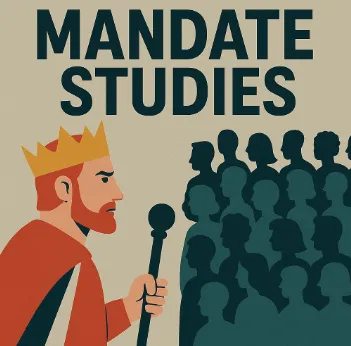
Understanding How the Mandate Effects Our Government by Sections of the Mandate
The following is a breakdown of the 900+ pages in a deeper breakdown of the authors, the standards, diagnosing the reforms, deep understanding of what our tax payer dollars provide and a deeper understanding of the deep Right. We do not have a deep Left issue, we have a issue with those who are lacking credibility with plans that are outlined in black and white. Instead of just living through the next 4 years, learn from America's Mistake for allowing nepotism to override political career morally sound individuals to decide people's fate versus those who are born of privilege. In these library of collective thoughts please feel free to join the movement...
Monitoring the Mandate by diving into the authors, contributors and current implementation of the project 2025 mandate created in 1978 first ran by Ronald Raegan with the Heritage Foundation.
Understanding the fundamentals of the Mandate by diving into the theories, philosophies and breakdowns from the section "Taking the Reins of Government" with break downs from
Understanding the fundamentals of the Mandate by diving into the theories, philosophies and breakdowns from the section "The Common Defense" with break downs from:
Understanding the fundamentals of the Mandate by diving into the theories, philosophies and breakdowns from the section "The General Welfare" with break downs from:
Understanding the fundamentals of the Mandate by diving into the theories, philosophies and breakdowns from the section "The Economy" with break downs from:
Understanding the fundamentals of the Mandate by diving into the theories, philosophies and breakdowns from the section "Independent Regulatory Agencies" with break downs from:
Understanding the fundamentals of the Mandate by diving into the theories, philosophies and breakdowns from the section "Onward" with break down and final thoughts on project 2025:
Understanding the Mandate , What it means to you and how can we grow from learning it.

Stand up for US Department of Education Against Project 2025 Mandates
The future of education is at a crossroads, and the Department of Education plays a vital role in ensuring access to quality learning opportunities for all. However, proposed policies threaten to dismantle essential programs, impacting students, teachers, and communities nationwide. By joining together, we can advocate for a strong, well-supported education system that prioritizes inclusivity, innovation, and success. Whether through raising awareness, participating in discussions, or pushing for informed policies, every effort counts in safeguarding the integrity of public education.
This is a call to action for educators, advocates, and concerned citizens to come together and make a difference. Through collective knowledge and active engagement, we can challenge harmful reforms and champion initiatives that strengthen the Department of Education. The upcoming virtual workshop on April 21-23 will provide key insights into these urgent matters, equipping participants with the tools to take action. Let’s stand for the future of education—because protecting learning today ensures a brighter tomorrow for all. Join us in this mission and help drive meaningful change!
Power Point For 3 Day Workshop 6pm-8pm April 21-23, 2025
Understanding the Mandate Which Touches the Following
The following is a breakdown of the 900+ pages in a deeper breakdown of the authors, the standards, diagnosing the reforms, deep understanding of what our tax payer dollars provide and a deeper understanding of the deep Right. We do not have a deep Left issue, we have a issue with those who are lacking credibility with plans that are outlined in black and white. Instead of just living through the next 4 years, learn from America's Mistake for allowing nepotism to override political career morally sound individuals to decide people's fate versus those who are born of privilege. In these library of collective thoughts please feel free to join the movement...
Executive overreach redefining the Constitution and it's relationship with the other branches
The Common Defense Outlining the Agency Roles
US Press
International Press
The Economy Outlines the Roles
Case for Fair Trade
Case For Free Trade
The Independent Regulatory Agencies Outlines the Roles For Agencies
The propose for this Summary is in an attempt to allow others to understand that this mission statement known as the Mandate is different than just a political movement. This movement purpose is not meant to help those who it claims to and we would argue that their Mandate has and will do damage to our world. This has been a journey of exploration, interesting, hypocritical, short sighted and often times cruel in nature.
Small Call to Action Headline
Small Call to Action Headline

Website Development
Custom Website DesignResponsive Web DevelopmentUser Experience (UX) DesignE-commerce Website DevelopmentContent Management System (CMS) Integration

Dev Development
Full-Stack DevelopmentFrontend DevelopmentBackend DevelopmentAPI Development and IntegrationDatabase Design and Management

Scrum Master Services
Agile Project ManagementScrum Master ConsultationSprint Planning and ExecutionTeam Collaboration and CoordinationContinuous Improvement Strategies

Mobile App Design
iOS App Development
Android App Development
Cross-Platform App Development
Mobile App UI/UX Design
App Maintenance and Support

Online Marketing
Search Engine Optimization (SEO)Social Media MarketingContent MarketingEmail MarketingPay-Per-Click (PPC) Advertising

Drone Services
Aerial Photography and VideographyDrone Mapping and SurveyingInspection and Monitoring ServicesGIS (Geographic Information System) IntegrationCustom Drone Software Development
“ eMillion Concepts. eMillion People. eMillion Solutions.”
© 2024 E-Millions Consulting Services - All Rights Reserved,
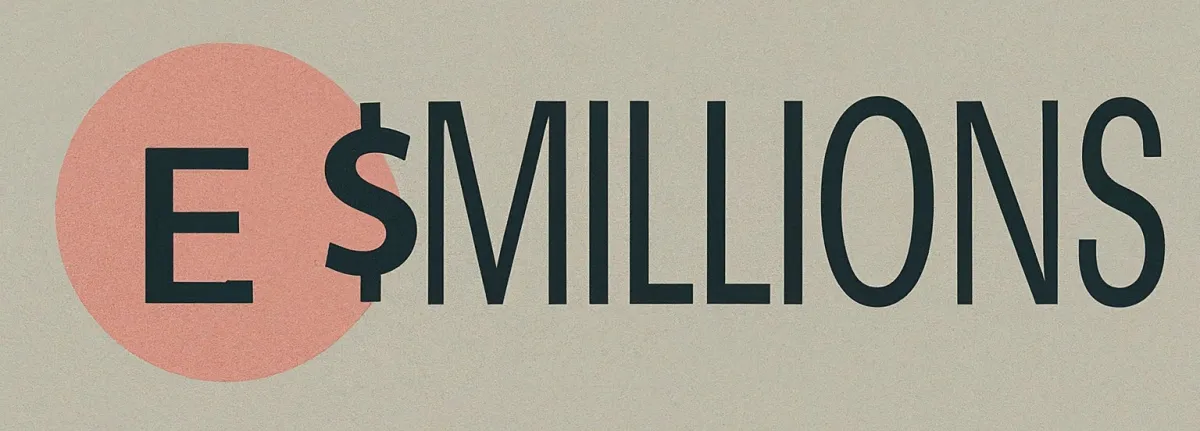
etechmilli@gmail.com
(404) 723-3940
© 2026 Company Name - All Rights Reserved, consectetur adipiscing elit. Maecenas commodo suscipit tortor, vel tristique sapien
